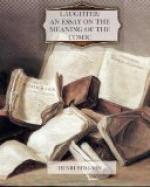CHAPTER II
THE COMIC ELEMENT IN SITUATIONS AND THE COMIC ELEMENT IN WORDS
I
We have studied the comic element in forms, in attitudes, and in movements generally; now let us look for it in actions and in situations. We encounter, indeed, this kind of comic readily enough in everyday life. It is not here, however, that it best lends itself to analysis. Assuming that the stage is both a magnified and a simplified view of life, we shall find that comedy is capable of furnishing us with more information than real life on this particular part of our subject. Perhaps we ought even to carry simplification still farther, and, going back to our earliest recollections, try to discover, in the games that amused us as children, the first faint traces of the combinations that make us laugh as grown-up persons. We are too apt to speak of our feelings of pleasure and of pain as though full grown at birth, as though each one of them had not a history of its own. Above all, we are too apt to ignore the childish element, so to speak, latent in most of our joyful emotions. And yet, how many of our present pleasures, were we to examine them closely, would shrink into nothing more than memories of past ones! What would there be left of many of our emotions were we to reduce them to the exact quantum of pure feeling they contain, by subtracting from them all that is merely reminiscence? Indeed, it seems possible that, after a certain age, we become impervious to all fresh or novel forms of joy, and the sweetest pleasures of the middle-aged man are perhaps nothing more than a revival of the sensations of childhood, a balmy zephyr wafted in fainter and fainter breaths by a past that is ever receding. In any case, whatever reply we give to this broad question, one thing is certain: there can be no break in continuity between the child’s delight in games and that




